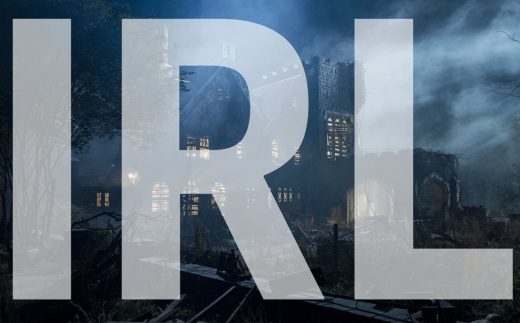What we’re watching: Best of 2018

With 2019 just around the corner, we’re ready to look back and pick a few favorites from the flood of TV shows that arrived in 2018. Senior Editor Kris Naudus explains why Netflix already has an anime series you should watch with Hi Score Girl. But first, a few quick “best” suggestions so you can quit scrolling through your queue and just watch something already.
Christopher Schodt: Apparently the US has forgotten how to make half-hour comedies, but Schitt’s Creek shows Canada still knows how. It’s not revolutionary, but despite the terrible title it’s a fun show with great performances.
Mariella Moon: The Haunting of Hill House. Everything else is confetti.
Kris Naudus: She-Ra. She-Ra She-Ra She-Ra. Sheeeeeee-Ra. The new show is fun and joyful and actually makes what was originally a toy commercial into a well developed universe with deep characterization. Also, SwiftWind is one woke horsey.
Richard Lawler: Look, you can watch Killing Eve of your own free will or I can come to your house and make you. Either way works for me.
Hi Score Girl

Kris Naudus
Senior Editor
Ask most people what arcades look like, and they’ll probably describe games like Pong and Space Invaders sitting in dimly-lit, neon-decorated rooms filled with smoke and a soundtrack of Pac-Man Fever. Arcades are firmly grounded in our collective consciousness as peak eighties culture, which is odd when you consider the average gamer these days is in their mid-30s and much too young to have experienced that era. For those adults marching closer toward middle age, our actual arcade nostalgia is set in the early ’90s: The era of Cruis’n USA, Lethal Enforcers and the six-player beat ’em up X-Men. And fighting games. Oh man, the fighting games. Street Fighter II and all those it inspired, like Fatal Fury, Mortal Kombat and Virtua Fighter. Burning through a stack of quarters as you tried to master every move, fight every boss and stand up against the surly teenagers who would inevitably kick you off the machine.
One of Netflix’s upcoming anime premieres, Hi Score Girl, is a love letter to that era. Ostensibly it’s about a little video-game-obsessed boy living in 1991 Japan, who befriends a shy classmate of his with The Wizard-esque levels of skill when it comes to any game she gets her hands on: The eponymous “Hi Score Girl.” But really, what it’s really about is how it felt to live in that era, what it was like to learn how to play these games, to face off against random challengers much older than yourself and finding the best ways to make your meager allowance of quarters (or in this case, 100-yen coins) go a lot further. It’s chock full of nerdy references, sure. (How often are you ever going to hear any show refer to the “Waiting Guile?”) And the show goes a long way toward establishing some authenticity, even enlisting composer Yoko Shimomura to make the music: She was one of the original composers for Street Fighter II (though these days she’s probably better known for Kingdom Hearts).
But what really lifts Hi Score Girl above reference fests like Ready Player One is that it’s a show about how it felt to live in that era, regardless of specific game titles or music or any other material things that existed then. Name-checking a beloved title can certainly inspire a pang of nostalgic familiarity, but Hi Score Girl wants to remind you what childhood itself felt like. The specific games are irrelevant to the overall story of these two children’s friendship, where it takes them and the sense of wonder at each new experience. That’s the kind of childhood throwback I can really get behind. Well, that and a spinning bird kick.
Bojack Horseman

Nick Summers
Reporter
BoJack Horseman is one of the smartest and most emotionally gut-wrenching shows Netflix has ever produced. Season five continues to explore Bojack, a frequently drunk, angry and drug-fueled person who has committed some truly (truly) horrific deeds, as he tries to piece his life back together and support those who stick by him. The show’s relentless interrogation of Hollywood, celebrity culture and mental health is utterly captivating, as always.

Daniel Cooper
Senior Editor
Killing Eve (Hulu): British Phoebe Waller-Bridge fans had to wait months before Killing Eve made it to the UK, but the effort to avoid spoilers was worth it. But will it still be brilliant now that its creator is stepping back to work on Fleabag?
Succession (HBO Go): Ignore the haters and the US TV critics who couldn’t warm up to a subtle, black-as-night satire about the struggles of the one percent. The writing was razor sharp, the acting was brilliant and I can’t wait for more, although a couple of weird plot twists annoyed me.
The Good Place (Netflix): Three reboots in a row meant that fans were understandably a little tired of The Good Place’s shtick at the start of this year. But thankfully, the supposed dip in quality was a misdirect as the show laid the pipe for its two-thirds-way-through-the-season-mid-season finale.
Great News (Netflix): For all of the talk about rebooting 30 Rock, we already had more 30 Rock, but you suckers wouldn’t watch it.
Intercity 125: The Train That Saved Britain’s Railways (Demand 5 — UK Only): Its qualities as a documentary aren’t great, given that it only had three pieces of b-roll that it had to use constantly for an hour. But this was an insightful look into the perilous state of British Rail and the technology that saved it.
The Joel McHale Show with Joel McHale (Netflix): Netflix’s The Soup revival was welcome, but came across as weirdly sterile and as if it was pulling its punches. Rather than cover the full pantheon of reality TV weirdness, it seemed to focus on a handful of non-E! reality shows, as if bound by a non-disparagement clause.
Brooklyn Nine-Nine (Netflix): I started watching The Good Place, and thought I should give B99 another try, and I’m glad that I did, because it’s a fun way to spend 22 minutes.
John Mulaney: Kid Gorgeous at Radio City (Netflix): I think this Mulaney kid’s got some talent, he could go far.
“IRL” is a recurring column in which the Engadget staff run down what they’re buying, using, playing and streaming.
(17)


